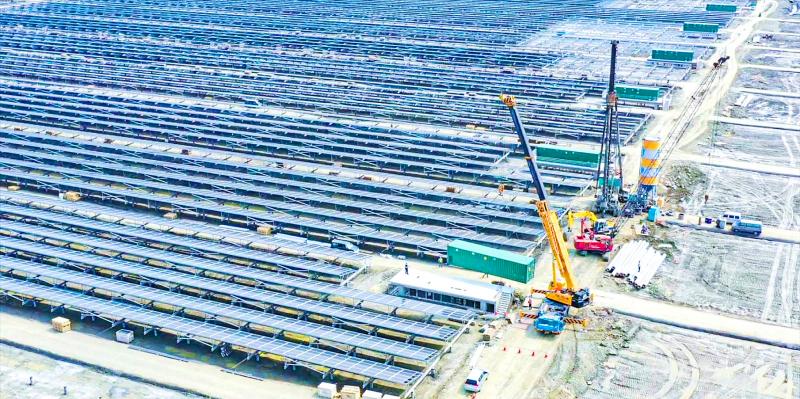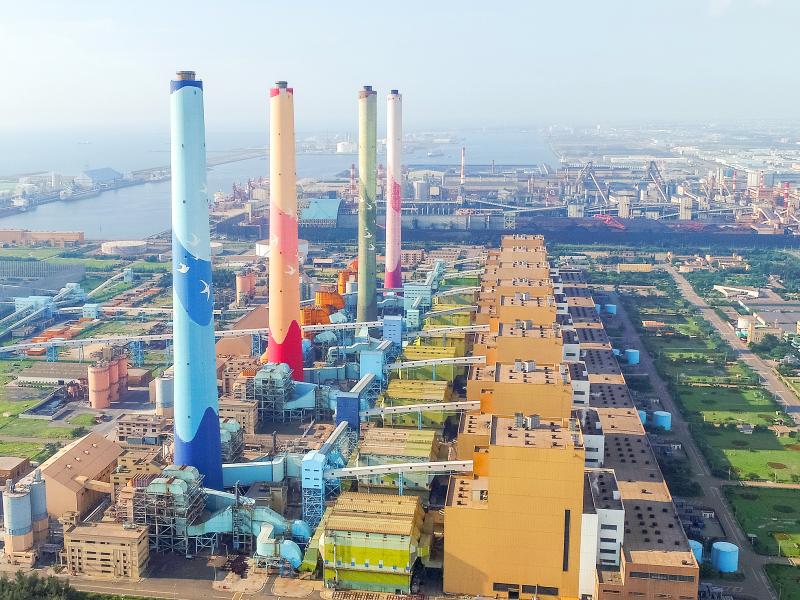This week, the government announced that electricity prices would not be raised for the next six months. Taipower had proposed raising the rates a mere 0.07 percent. The reason given for the rejection of the new rate was that the tiny increase would not cover the administrative costs of making the adjustment. Moreover, Taipower is finally making money again after five years of no profits.
Those of us who from time to time pay attention to the government’s decisions to subsidize utility prices were a bit bemused by this strange logic. Surely, it’s reasonable to suggest that if the rate hike were too low, it can be increased. Higher electricity prices would likely be very good for the nation, though consumers (read: voters) would howl.
However, the committee in charge decided to wait until September to see the effects of adjustments to Taiwan’s power generation structure. Roughly 300 firms, comprising nearly half the nation’s electricity demand, are under government mandates to increase their renewable power generation.

Photo courtesy of Taipower
SUBSIDY BUBBLE
And so, once again, the government declined to let Taiwan’s consumers leave their bubble of low prices.
Decades of subsidized prices, together with a total lack of government leadership on conservation — Wait. Suddenly I’m so confused. What public good am I talking about? Low water prices? Too many housing units? Low assessed tax value of homes? Too many roads? Too many universities? Low prices for staple agricultural goods? Too little spending on the military? Low overall tax collection from the economy? Low taxes on the rich?

Photo courtesy of City of Taichung
It seems like everywhere you look there’s a subsidy bubble, with its own population of bubble boys, all in-moolah compromised, all interlinked, a mutually reinforcing circle of retrogressive handouts.
The electricity bubble is sustained by an “electricity iron triangle” of the Democratic Progressive Party (DPP), Taipower’s labor unions, and environmental NGOs, according to a recent paper from Huang Chi-lun (黃寄倫) and Chen Rung-yi (陳蓉怡). While these groups support renewables, none advocate for fundamental change.
When the DPP came to power after the 2016 election, it set about reorganizing the power company. Originally it planned to break up Taipower into four organizations but eventually it settled on two. When the DPP realized it could appoint the leaders of these companies, it became reluctant to engage in privatization as it had originally planned.
Hung and Chen argue that DPP policy is constrained by its Ministers without Portfolio, who often make important decisions but are not subject to legislative interpellation.
The DPP also created a new cabinet-level body, the Office of Energy and Carbon Reduction. This further slowed things down, exacerbated by the traditional antipathy of the bureaucracy towards the DPP.
Meanwhile, the Taipower labor union, strongly supportive of nuclear power, began to struggle against the reforms, contending that they had been left out of the discussions. With more than 27,000 workers in 2016, the company union had serious clout. The government was eventually forced to concede on several points after workers threatened to go on strike during a typhoon.
Hung and Chen also argue that most environmental NGOs are compromised by their close relationship to the DPP. Some of their officials were taken up into the new government. In other cases, such as the restart of the nuclear power plant in 2018, many NGOs remained silent, though they had publicly stated they would oppose all nuclear power.
NOT ENOUGH
The result is government policy that is incremental rather than fundamental. Both media and industry observers have criticized the government’s renewable energy policy, arguing its mandates are too small.
For example, on Jan. 1 the government began its program to add 1GW to the renewable energy market by making Taiwan’s 300 largest users of electricity boost their renewable portion to 10 percent within five years.
Tiffany Huang (黃台芬), a partner with international law firm Baker & McKenzie, and head of its construction and power project practice groups in Taiwan, was quoted by the Taipei Times on the government’s 1GW requirement:
“From the renewable energy developer’s point of view, 1GW is not enough. Ten gigawatts will be released on the third round of the Offshore Wind Farm program alone.”
A recent Liberty Times (Taipei Times’ sister paper) editorial observed that even if the government reaches its carbon emissions goal of less than half of 2005 levels by 2050, per capita carbon emissions will still be 5.4 to 6 tonnes. The Paris climate agreement’s goal is 1 to 1.7 tonnes per capita by 2050, a figure many climate activists consider still much too high.
Decades of subsidies for electricity prices have led to all sorts of pernicious effects (though it seems ridiculous to identify these problems, petty in the face of policies that essentially involve boiling the ecosphere in the future in order to win elections in the present).
Smaller firms will struggle to implement renewable energy because of the large investments involved. Across Taiwan, especially in lower-income households, electrical appliances remain inefficient users of power. Consciousness of electricity use is practically non-existent except in the summer when electricity bills spike because of air conditioning. As someone who came of age in the American energy crisis of the late 70s, I am often shocked by the casual way that lights are left on.
As the government moves to increase renewables in the energy supply, resistance from consumers will only grow: electricity prices will have to go up, and consumers will blame renewables. That will make it easier for groups opposed to renewables — such as pro-nuke groups — to sell their ideas to the public.
Moreover, other subsidy regimes such as low water prices will also come under increasing pressure in the next decade. Wrenching changes in local lifestyles will occur in tandem with rising renewable energy inputs. That will not seem like a coincidence to consumers. Environmental protections and renewable energy installations will make easy whipping boys for groups opposed to the DPP and to progressive public policy.
IMMEDIATE ACTION NEEDED
Ironically, the DPP’s slow, tepid renewable energy policies will only lead to further slow renewable energy growth, coupled with threats to the DPP’s hold on power. With every signal from our environment screaming that the Earth is overheating, we need bold action now.
To decouple electricity prices from implementation of renewable energy, the government needs to start raising electricity prices yesterday. It needs to stop underestimating the public and start explaining that electricity prices will have to rise and why. Education is absolutely urgent and should have started a decade ago.
The government needs to initiate a subsidy program to hand out solar panels like Halloween candy. It also needs to change the building codes to mandate environmentally-sound, solarized infrastructure. That means that yet another longstanding subsidy regime, the proliferation of illegal rooftop structures, will probably have to go.
The government also needs to take the plunge and compel employers to raise wages to enable consumers to weather these changes. Impoverished citizens living from hand-to-mouth in low-wage jobs and rental housing have little motivation or ability to implement important lifestyle changes. The nation’s wage structure is a subsidy that has been allowed to persist far too long.
Taiwan is widely recognized as a world leader in COVID-19 policy. Commentators have viewed this success as an important win for Taiwan’s soft power.
Imagine how Taiwan would look as a nation completely free of fossil fuels and running on geothermal, solar, and wind.
More than just a win for Taiwan’s soft power, that would be a victory for all humankind.
Notes from Central Taiwan is a column written by long-term resident Michael Turton, who provides incisive commentary informed by three decades of living in and writing about his adoptive country.

Jacques Poissant’s suffering stopped the day he asked his daughter if it would be “cowardly to ask to be helped to die.” The retired Canadian insurance adviser was 93, and “was wasting away” after a long battle with prostate cancer. “He no longer had any zest for life,” Josee Poissant said. Last year her mother made the same choice at 96 when she realized she would not be getting out of hospital. She died surrounded by her children and their partners listening to the music she loved. “She was at peace. She sang until she went to sleep.” Josee Poissant remembers it as a beautiful

March 2 to March 8 Gunfire rang out along the shore of the frontline island of Lieyu (烈嶼) on a foggy afternoon on March 7, 1987. By the time it was over, about 20 unarmed Vietnamese refugees — men, women, elderly and children — were dead. They were hastily buried, followed by decades of silence. Months later, opposition politicians and journalists tried to uncover what had happened, but conflicting accounts only deepened the confusion. One version suggested that government troops had mistakenly killed their own operatives attempting to return home from Vietnam. The military maintained that the

Before the last section of the round-the-island railway was electrified, one old blue train still chugged back and forth between Pingtung County’s Fangliao (枋寮) and Taitung (台東) stations once a day. It was so slow, was so hot (it had no air conditioning) and covered such a short distance, that the low fare still failed to attract many riders. This relic of the past was finally retired when the South Link Line was fully electrified on Dec. 23, 2020. A wave of nostalgia surrounded the termination of the Ordinary Train service, as these train carriages had been in use for decades

Lori Sepich smoked for years and sometimes skipped taking her blood pressure medicine. But she never thought she’d have a heart attack. The possibility “just wasn’t registering with me,” said the 64-year-old from Memphis, Tennessee, who suffered two of them 13 years apart. She’s far from alone. More than 60 million women in the US live with cardiovascular disease, which includes heart disease as well as stroke, heart failure and atrial fibrillation. And despite the myth that heart attacks mostly strike men, women are vulnerable too. Overall in the US, 1 in 5 women dies of cardiovascular disease each year, 37,000 of them